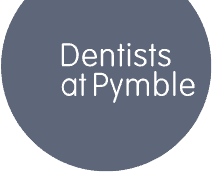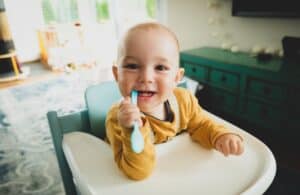 Are They Important?
Are They Important?
There is a common misconception that baby teeth are not as important as adult teeth. So, for example, if they get a hole or become decayed, then it does not really matter as they are just going to fall out anyway.
But did you know baby teeth are just as important as your adult teeth?
At Denstists at Pymble, we know that baby teeth are extremely important. However, we often find that there is a misconception about just how vital they actually are.
In this article, we are going to start by talking about what baby teeth are, why they are important, and why baby teeth treatment is necessary. We will also look at how to best care for your child’s teeth, from practising good oral hygiene to ensuring good dietary habits.
What are baby teeth?
Baby teeth are the first set of teeth that come through (erupt). Often, they are called baby teeth because they come through when we are babies.
Your dental professional though may call them deciduous or primary teeth. While other people may refer to them as milk, first or temporary teeth.
We have 20 baby teeth, which start to form in the jawbone before we are born.
Baby teeth will generally start to erupt into the mouth from between 6 to 12 months. And by the age of 3, all 20 teeth usually will have erupted and be in position. However, at Denstists at Pymble, we know that there is a wide range of variability when it comes to the eruption of teeth. There is no right or wrong age for them to start erupting or even being lost.
Baby teeth are designed to be our first set of teeth, and will eventually start to fall out.
The baby teeth will generally start to become wobbly and fall out (exfoliate) at around the age of 5-6. By 12 years of age, most of them will have been lost.
Once baby teeth are lost, they are then replaced by our second, and final, set of teeth. Often called our permanent, adult or secondary teeth.
Why are baby teeth important?
Baby teeth are just as important as adult teeth, as all teeth play an important role within our mouth.
Firstly, teeth help your child to be able to eat and chew their food – which is important for nutrition and growth. They also help in the pronunciation and formation of words to be able to speak.
Baby teeth are also important for your child’s smile! This is because teeth play an important role in aesthetics and confidence. Did you know children with missing teeth can often experience self-esteem issues?
However, from a dental perspective, baby teeth are also extremely important for the development of the jawbone, facial bones and muscles. They provide a special role in maintaining space, and acting as placeholders, for the adult teeth to erupt later on.
At Denstists at Pymble, we think this is quite possibly their most important function!
Do holes in baby teeth need to be treated?
Like our adult teeth, baby teeth are at risk of dental decay – which are often referred to as holes. Even though a baby tooth is eventually going to be lost and replaced by a new tooth, getting the decay treated and fixed is still important.
If decay in a baby tooth is left untreated, it can cause pain and discomfort for your child. It can also cause infection which can be extremely serious if not managed.
Furthermore, if a baby tooth is lost prematurely or too early, it can affect the functioning of the mouth. This is because the other teeth may start to move, tilt or lean into the space where the tooth was lost. This can present a range of challenges in the future and may require more pressing orthodontic treatment to resolve.
So, if your oral health professional diagnoses decay in a child’s baby tooth, they will talk to you about your treatment options.
And remember… the earlier the decay is detected and treated, the better the outcomes for the tooth and the less traumatic it can be for your child.
This is why practising good oral hygiene habits and visiting your dentist, or oral health professional, regularly are important!
Why do some baby teeth need to be extracted?
The removal or extraction of a baby tooth may be indicated by your dentist or oral health professional for a few reasons.
Firstly, a filling or other more extensive dental treatments are no longer possible if a baby tooth is significantly damaged by tooth decay. Unfortunately, the tooth cannot be saved despite our best efforts. The tooth may need to be extracted to prevent pain or infection if this happens.
In some cases, a baby tooth may need to be removed to help encourage other teeth to grow in a better position by creating room.
Finally, if there has been a significant trauma or an accident involving a baby tooth, then it may also require extraction as unfortunately, it may not be able to be saved either.
What can happen if a baby tooth is removed or extracted too early?
At Denstists at Pymble, we always do our best to save teeth. However, sometimes teeth need to be extracted.
Unfortunately, when a baby tooth is removed too early, meaning before it is time for it to naturally fall out, then it can present some challenges.
As we have already mentioned, sometimes when teeth are lost early the other neighbouring teeth may start moving. They may start to drift, lean, or tilt into the space. This can compromise the space for the adult tooth when it does start to erupt. It can also be an issue for the tooth that has started to move.
So, if a baby tooth is extracted, depending on which tooth it is, your oral health professional may recommend placement of a space maintainer.
A space maintainer, as the same suggests, helps prevent or reduce the risk of the other teeth moving into the space where the tooth once was. Therefore, it maintains the space for the new adult tooth to eventually erupt in by limiting the movement of the neighbouring teeth.
At the beginning of this article, we talked about how important baby teeth are.
As baby teeth have a range of functions and roles to play – from growth and development to speech and ingestion, they also have a massive impact on self-esteem.
So, when a baby tooth is lost or removed prematurely, these factors can all be affected!
How do you care for baby teeth?
It is important that you start caring for baby teeth from the start!
Introducing your child to good oral hygiene habits from an early age helps encourage positive dental behaviours in the future. It also helps prevent or reduce your child’s risk of dental disease.
At Dentists at Pymble, we recommend that you start by practising good oral hygiene habits at home by:
- Toothbrushing:
- Brush your child’s teeth at least twice a day.
- You should brush your child’s teeth until they are at least 8-9 years old, as they do not yet have the manual dexterity to do it correctly.
- Always choose a toothbrush with soft bristles and a small head.
- Toothpaste:
- You do not need to use toothpaste until your child is older than 18months.
- Once 18months, introduce a fluoride-containing toothpaste.
- Remember to always use a toothpaste appropriate for your child’s age as the fluoride content can be too high otherwise.
- Be careful to store the toothpaste somewhere safe and out of your child’s reach
- Always spit out the excess toothpaste, rather than swallowing it.
- Cleaning in between:
- Once your child is old enough and has become familiar with brushing, introduce flossing or the cleaning of in-between their teeth to remove plaque and bacteria.
- Any teeth which touch should be flossed or cleaned in-between.
At Denstists at Pymble we know that it isn’t always easy to get your child to clean their teeth! So, if you are struggling then talk to us. We can give you tips and tricks to make it easier. Lastly, diet!
Maintaining a well-balanced diet is important for everyone. But diet and dietary habits are also extremely important in caring for your child’s teeth.
At Denstists at Pymble, we recommend the following suggestions:
- Avoid sharing utensils, food, and drinks with your child as it is an easy way to transfer oral bacteria.
- Avoid using sweeteners on bottles and your child’s pacifier. Also, avoid putting your child to bed with a bottle of milk or any other liquids other than water in their bottle.
- Wean your child off a bottle by around 12-14months of age.
- Limit intake of sugary foods and drinks, such as lollies and biscuits.
- Try to avoid snacking, or choose unprocessed foods like vegetables, nuts, cheese and lean meats.
- Always rinse well with water after consuming food.
These simple things can make a huge difference in reducing your child’s risk of dental decay and other dental diseases.
Oh, and don’t forget…
once your child has teeth, or by the time they are 12 months old, they should start seeing an oral health professional for their routine dental check-up!
So, that brings us to the end of this article. And wow, haven’t we covered a lot! But the team at Denstists at Pymble want you to remember…
…baby teeth are just as important as adult teeth and taking care of them is extremely important for your child’s health and development.
You can take care of baby teeth by practising good oral hygiene and dietary habits at home.
If you have any other questions or if you would like more information on anything discussed in this article, then we invite you to contact the practice on 02 9488 7555 to arrange an appointment with our friendly team.
Form everyone at Denstists at Pymble thank you for reading this article!
References:
- Health Mouth American Dental Association. Baby teeth. URL: https://www.mouthhealthy.org/en/az-topics/b/baby-teeth. Accessed: 6 April 2020.
- Australasian Academy of Paediatric Dentistry. Why is it important to fix baby teeth? (17/6/2016). URL: https://www.aapd.org.au/post/Why-it-is-important-to-fix-baby-teeth#.Xq9iVagzaUk. Accessed: 6 April 2020.
- Kagihara LE, Niederhauser VP, Stark M. Assessment, management and prevention of early childhood caries. Journal of the American Academy of Nurse Practitioners. 2009;21(1):1-10.
- Orthodontics Australia. Does your child need space maintainers before braces?. URL: https://orthodonticsaustralia.org.au/space-maintainers-before-braces/. Accessed: 6 April 2020.
- Australian Dental Association. 2019. Children’s oral health: caring for your child’s oral health. URL: https://www.ada.org.au/getattachment/Your-Dental-Health/Resources-for-Professionals/Resources-for-Children-0-11/Children-s-Oral-Health/ADA_OHP_Factsheets_Childrens-Oral-Health-18032019.pdf.aspx. Accessed 6 April 2020.
- Australian Dental Association. Babies. URL: https://www.ada.org.au/Your-Dental-Health/Children-0-11/Babies. Accessed: 6 April 2020.
- Colak H, Dukgergilk CT, Dalli M, Hamidi MM. 2013. Early childhood caries update: a review of causes, diagnoses and treatments. J Nat Sci Biol Med. 2013;4(1):29-38. URL: https://www.ncbi.nlm.nih.gov/pmc/articles/PMC3633299/.
- Health Direct. How your baby’s teeth develop. September 2019. URL: https://www.pregnancybirthbaby.org.au/how-your-babys-teeth-develop. Accessed: 6 April 2020.
- New South Wales Government. Early Childhood oral health guidelines for child health professionals. 3rd edn. 2014. URL: https://www1.health.nsw.gov.au/pds/ActivePDSDocuments/GL2014_020.pdf. Accessed: 6 April 2020.
- Australian Dental Association. Toddlers. URL: https://www.ada.org.au/Your-Dental-Health/Children-0-11/Toddlers. Accessed: 6 April 2020.

 Are They Important?
Are They Important?